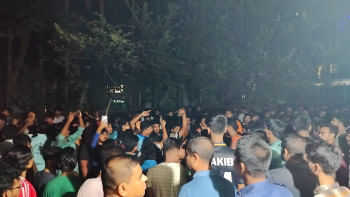Death toll from Iraq bombing rises to 70
 A member of Iraq security personnel inspects the site of a car bomb attack at Jadidat al-Shatt in Diyala province, 40 km (25 miles) north of Baghdad, June 10. Photo: Reuters
A member of Iraq security personnel inspects the site of a car bomb attack at Jadidat al-Shatt in Diyala province, 40 km (25 miles) north of Baghdad, June 10. Photo: Reuters
Insurgents attacked cities across Iraq on Monday with car bombs, suicide blasts and gun battles that killed more than 70 people in unrest that has deepened fears of a return to civil war.
No group claimed responsibility for the day-long attacks, most of them in northern Iraq, but officials blame much of the violence that has killed nearly 2,000 people since April on Sunni Islamist insurgents linked to al Qaeda's local wing.
Weeks of bloodshed have accompanied rising political tensions between Iraq's majority Shia leaders and members of the Sunni community, who believe they have been marginalised since the fall of Saddam Hussein after the 2003 US-led invasion.
But war in neighboring Syria, where Shia Iran and the region's Sunni Gulf states are backing opposing sides, has also put pressure on Iraq's own balance among Shia, Sunni and ethnic Kurds who share power in a fragile government.
Markets in two northern Iraqi towns were hit early on Monday, police said. Later attacks targeted security forces. In the northern city of Mosul, suicide bombers and rocket fire struck police headquarters, killing 24, many of them police and soldiers.
"I was selling watermelon and suddenly I heard a powerful blast at the entrance to the market. I fled from the dust and smoke when a second blast turned the place into hell," said Hassan Hadi, a farmer wounded in one of the market attacks.
"I was hit in my leg and lay down in shock."
Most of the apparently coordinated violence hit the north of the country and included at least eight suicide blasts and gun battles at military bases or checkpoints.
Two roadside bombs also exploded near a cafe, killing four people in the Shia district of Sadr City, northeastern Baghdad, police said.
Suicide attacks are the signature of al Qaeda's Iraqi affiliate, Islamic State of Iraq, and their growing frequency, in particular so many in one day, appears to indicate the extent to which Islamist insurgents are regrouping.
Invigorated by Syria's mostly Sunni revolt and tapping into bitter Iraqi Sunni discontent with the Shia-led government, al Qaeda's local wing is regaining some ground lost during its war with US troops, who left Iraq in December 2011.
Since December, thousands of Sunnis have protested against the government. But an Iraqi army raid on a Sunni protest camp in the town of Hawija in April reignited violence.
Monthly death tolls since then have been the worst since the inter-communal bloodletting five years ago that killed tens of thousands, partitioned Baghdad into districts based on religious sect and drove Iraq to the edge of civil war.
At the height of Iraq's sectarian violence, the monthly death count sometimes topped 3,000.
Iraqi military forces are better equipped and trained than at the peak of the conflict, but they lack the comprehensive intelligence resources and air cover capability to track insurgents that they enjoyed under US military guidance.

 For all latest news, follow The Daily Star's Google News channel.
For all latest news, follow The Daily Star's Google News channel. 



Comments